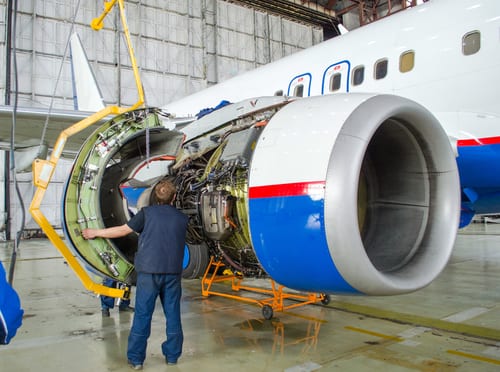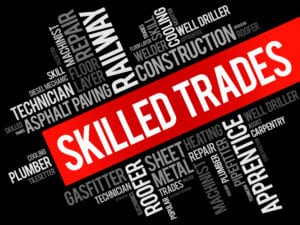
In an economic climate that is highly competitive and sees almost 4 million newly-minted college graduates every year, people are beginning to consider other options. Time commitment, cost, and diminishing prospects for landing a high-paying job right of college are affecting trends in higher education. More and more typically college-age students are foregoing college and entering trade schools. Numbers of students seeking to carve out a career in a skilled trade have been increasing over the past five years, and have more than doubled in the past two decades. Between 2020 and 2025 this number is expected to grow even more. While greater automation is causing some skilled trades to disappear, many other skilled trades and occupations will not be going away any time soon. This list provide 40 of the best-paying trades that will provide good pay and long-term employment stability.
Recommended Schools
In the following list of highest-paying trades or vocations, we included 30 trade jobs that can be typically obtained through a 2-year or less trade school diploma program or 2-year associate degree program. We have also included a bonus section of 10 career opportunities that will require some additional education, such as a bachelor’s degree. The wage data given represents the median income of the given trade or skill discussed. For each profession listed, the salary potential is even greater than the average annual and hourly earnings we have listed. Based upon data collected from the United States Bureau of Labor Statistics, Salary.com, Trade and Vocational School websites, and job descriptions from O*Net Online, this list shows, in the examples below, that it doesn’t always require a college degree to make very good money and enjoy doing it!
Do you ever wonder, “Which trade schools near me offer programs that offer the best education and training?” Besides featuring the highest paying trade jobs, our list also highlights the brick and-mortar and online technical schools that may be the best fit for your needs! Check out these page-jumps for a quick navigation of your options:
Table of Contents
- Top 30 High Paying Trades and Salaries At A Glance
- Rapid Fire Q and As
- 30 High Paying Trade School Degrees and Jobs
- AIR TRAFFIC CONTROLLER
- CONSTRUCTION MANAGER
- RADIATION THERAPIST
- ELEVATOR MECHANIC
- MARGIN DEPARTMENT SUPERVISOR
- DENTAL HYGIENISTS
- MULTIMEDIA ARTISTS or ANIMATORS
- LOGISTICS MANAGER
- FASHION DESIGNER
- WEB DEVELOPER
- DIAGNOSTIC MEDICAL SONOGRAPHER
- ELECTRIC POWER LINE INSTALLER & REPAIRER
- AIRCRAFT MECHANIC/AVIONICS TECHNICIAN
- BOILERMAKER
- RESPIRATORY THERAPIST
- HOME INSPECTOR
- RADIOLOGIC TECHNOLOGIST
- COURT REPORTER
- OCCUPATIONAL THERAPY ASSISTANT
- FUNERAL SERVICE WORKER
- ELECTRICIAN
- FOOD SERVICE MANAGER
- PLUMBER & PIPEFITTER
- PARALEGAL & LEGAL ASSISTANT
- Bonus 10: Higher Education Trades
- Frequently Asked Questions
Top 30 High Paying Trades and Salaries At A Glance
Are you curious about the Top 30 careers that made our list? We thought so! Not only are these career choices the highest paying jobs in our directory, but they are also very fulfilling professions. The goal is to make a ton of money and love what you do at the same time, right?
Take a look at these best trade jobs and how much money you can make!
- Air Traffic Controller (BLS) – Average Pay $130,420 Annually
- Construction Manager (BLS) – Average Pay $97,180 Annually
- Elevator Mechanic (BLS) – Average Pay $88,540 Annually
- Radiation Therapist (BLS) – Average Pay $86,850 Annually
- Margin Department Supervisor (Salary.com) – Average Pay $78,651 Annually
- Multimedia Artist & Animator (BLS) – Average Pay $77,700 Annually
- Web Developer (BLS) – Average Pay $77,200 Annually
- Logistics Manager (BLS) – Average Pay $76,270 Annually
- Dental Hygienist (BLS) – Average Pay $76,090 Annually
- Fashion Designer (BLS) – Average Pay $75,810 Annually
- Diagnostic Medical Sonographer (BLS) – Average Pay $70,380 Annually
- Cardiovascular Technician (BLS) – Average Pay $70,380 Annually
- Electric Power Line Installer & Repairer (BLS) – Average Pay $68,7030 Annually
- Aircraft Mechanic & Avionics Technician (BLS) – Average Pay $66,680 Annually
- Boilermaker (BLS) – Average Pay $65,360 Annually
- Radiologic Technologist (BLS) – Average Pay $63,710 Annually
- Home Inspector (BLS) – Average Pay $62,860 Annually
- Respiratory Therapist (BLS) – Average Pay $62,810 Annually
- Court Reporter (BLS) – Average Pay $61,660 Annually
- Occupational Therapy Assistant (BLS) – Average Pay $60,950 Annually
- Funeral Service Worker (BLS) – Average Pay $58,170 Annually
- Electrician (BLS) – Average Pay $56,900 Annually
- Food Service Manager (BLS) – Average Pay $56,590 Annually
- Plumber & Pipefitter (BLS) – Average Pay $56,330 Annually
- Paralegal & Legal Assistant (BLS) – Average $52,920 Annually
- Real Estate Agent or Broker (BLS) – Average Pay $51,220 Annually
- Geological & Petroleum Technician (BLS) – Average Pay $50,630 Annually
- HVACR Technician (BLS) – Average Pay $50,590 Annually
- Diesel Service Technician (BLS) – Average Pay $50,200 Annually
- Licensed Practical Nurse (BLS) – Average Pay $48,820 Annually
Recommended Schools
Rapid Fire Q and As
What is the difference between a trade school and a college? Trades schools focus on skill-based training. Your schooling will be specific to the trade of your choosing. Colleges are more broad-based, offering a general education, in addition to, the base courses of your degree for an associate degree and then onto the “meat and potatoes” so to speak, as you pursue your bachelor’s degree.
SEE: Trades You Can Learn Online
How much does a trade school cost? Considering that you typically aren’t spending four years in education to receive a trade degree or certificate, the cost of obtaining a specific trade is significantly less. Of course, it varies based on what trade you are pursuing but typically, trade school costs can range from $10,000 to $50,000 and average costs fall around $33,000.
SEE ALSO: Are Online Trade Schools Worth It?
Can I attend a trade school online? YES! The education world is moving towards online learning at a rapid pace! (Thanks, in part, to Covid-19). It certainly depends on the trade education you are seeking; however, you can enter into an online program for a wide array of vocational career options!
Are there vocational schools near me? Over the years, the number of trade schools has increased exponentially. The demand for a faster path to well-paying careers is at its highest, and public and private trade colleges became the answer to it! As most states have vocational schools, it is highly likely that, whatever your location is, you’ll find a trade program nearby.
30 High Paying Trade School Degrees and Jobs
AIR TRAFFIC CONTROLLER
Average income of an Air Traffic Controller:
$130,420 Annually / Hourly Rate $62.70

OVERVIEW:
As the best-paying job on this list, air traffic control is a vocational job that requires intense but few years of training. For every flight that comes into every airport around the world, women and men are working behind the scenes as air traffic control specialists. The safety of 1.7 million people daily depends on the care of air traffic controllers. Because of this, their training is very demanding. Although the path to becoming an Air Traffic Controller is varied, some prefer to begin by earning a bachelor’s degree; however, if you wish, you can obtain training through an FAA approved flight school. With the proper credentials (and possibly some work experience), you can reach your goal. The work requires constant vigilance and in order to be placed into federal civilian service, air traffic controllers must be certified by the FAA. You must begin your training before the age of 31!
Fast Facts:
-
- Average job growth over the next ten years – 1%; expect strong competition
-
- Projected job openings – 24,300
-
- Requires long-term on-the-job training,
-
- Often works in confined areas, such as control towers,
-
- Subject to very high-stress levels,
-
- Demands high concentration levels,
-
- Calls for work at all hours, nights and holidays; rotating shifts,
-
- Must pass a medical examination, background check, and drug screening,
-
- Job options include a Tower Controller, En Route Controller, or an Approach & Departure Controller.
VOCATIONAL DESCRIPTION:
Vocational jobs such as air traffic control specialists are quite demanding. Controllers direct traffic in the vicinity of airports. They must be responsible individuals who have a high ability to concentrate. They also must pass physical and security tests. Air traffic controllers must be willing to move where their work is required.
Basic Responsibilities of an Air Traffic Controller:
-
- Controls air traffic between altitude sectors and control centers by following established procedures and policies,
-
- Works directly with pilots to ensure safe take-offs and landings,
-
- Directs all ground traffic on taxiways and runways,
-
- Regulates commercial airline flights according to either company or government regulations,
-
- Organizes flight plans or traffic management plans,
-
- Inspects and adjusts radio control equipment,
-
- Alerts staff to aircraft emergencies,
-
- Contacts pilots to relay meteorological or navigational information.
For More Information On Air Traffic Controller Programs:

CONSTRUCTION MANAGER
Average income of a Construction Manager:
$97,180 Annually / Hourly Rate $46.72

OVERVIEW:
Construction Manager, also called General Contractor or Project Manager, is one of the highest paying trades on this list that does not always require a degree. Depending on the company’s job stipulations, a four-year bachelor’s degree is sometimes a necessity. But the good news is, some Construction Managers are qualified after several years of apprenticeship or work-related experience. As a Construction Manager, you must be willing to wear many hats for duties that are varied and can range from the initial planning to seeing the project through to completion, and everything in between. Also required are organizational and communication skills as well as knowing how to schedule work activity and resolve conflicts.
Fast Facts:
-
- Average job growth over the next ten years – 8%
-
- Projected job openings – 476,700
-
- Includes long work hours; nights, weekends and on-call duty – office hours and on project sites,
-
- Often is a very stressful position as you maintain crews, battle weather conditions, and meet deadlines,
-
- Requires continued education to maintain knowledge of innovative skills in construction and building code regulations,
-
- Similar occupations include Architect or Cost Estimator.
VOCATIONAL DESCRIPTION:
Construction managers organize, coordinate and supervise construction projects, must have a good head for economics, pricing and the need to balance costs in order to ensure that the project is achieved within a budget.
Basic Responsibilities of a Construction Manager:
-
- Confer with supervisory personnel, owners, contractors, architects, engineers, or design professionals to discuss and resolve matters, such as work procedures, complaints, or construction problems,
-
- Plan, schedule, or coordinate construction project activities to meet deadlines,
-
- Prepare and submit budget estimates, progress reports, or cost tracking reports,
-
- Inspect or review projects to monitor compliance with building and safety codes, or other regulations,
-
- Inspect or review projects to monitor compliance with environmental regulations,
-
- Manages a team of Carpenters, Sub-Contractors, and other Construction Managers.
LINKS AND FAQs:
See our Top Online Schools for Construction Management Degree Programs, as well as our FAQs on the subject:
For More Information on Construction Management Degrees:
Recommended Schools

RADIATION THERAPIST
Average income of a Radiation Therapist:
$86,850 Annually / Hourly Rate $41.76

OVERVIEW:
Depending on the job description, you may be able to receive your training as a Radiation Therapist through certifications or in a vocational school, which often results in the earning of an associate degree, the preferred degree by most employers in this field. Some Radiation Therapists continue their education by obtaining a bachelor’s degree. Radiation therapists generally work with patients who have been diagnosed with cancer. You will need to pass an exam to become ARRT certified. In addition, you will be required to know CPR. Radiation Therapists may need to give reassurance and supportive care to the people they are working with and the patient’s family.
Fast Facts:
-
- Average job growth over the next ten years – 7%
-
- Projected job openings – 18,500
-
- Works in hospitals, clinics, and outpatient surgery centers,
-
- Requires licensing and certifications in most states,
-
- Must take safety precautions due to radiation exposures,
-
- Work hours are normal due to the fact that most radiation treatments are planned, scheduled procedures
VOCATIONAL DESCRIPTION:
Radiation therapists provide radiation therapy to patients according to prescriptions from radiologists. The radiation must be applied carefully and according to regulatory standards. They must be trained to carefully read and review diagnoses and prescriptions. They often act as go-betweens for doctors and patients. Therapists usually assist oncology teams in preparing equipment and protection devices. They must be on their feet for many hours a day. Radiation therapists must be strong enough to lift or position patients.
Basic Responsibilities of a Radiation Therapist:
-
- Accurately position patients for radiation treatment,
-
- Keep patients and their families informed of treatments and what to expect;
-
- Monitor side effects of treatments,
-
- Administer the prescribed doses of radiation to different areas of the body;
-
- Follow the rules for the protection of all near the radiation,
-
- Enter data into computers; reporting unusual reactions to the physician,
-
- Check radiation equipment for proper operation,
-
- Assist in the preparation of sealed radioactive substances.
For More Information On Radiation Therapy Training:

ELEVATOR MECHANIC
Average income of an Elevator Mechanic:
$88,540 Annually / Hourly Rate $42.57

OVERVIEW:
Working as an Elevator Mechanic is one of the high-paying jobs on this list that requires only an apprenticeship. To get started all you need is a high school or GED diploma. Elevator Mechanics install and repair elevators, in addition to moving walkways and escalators. They also must regularly maintain the equipment and meet all safety codes. The apprenticeship training programs for becoming an Elevator Mechanic generally takes around 4 years to complete. Apprenticeships are often available through labor unions or contractors and they usually pay about 50% of what your future earnings will be. If you can weld too, all the better!
Fast Facts:
-
- Average job growth over the next ten years – 7%
-
- Projected job openings – 28,900
-
- Works in tight spaces and hot machine rooms,
-
- Requires exposure to elevated heights,
-
- At this time, 35 states require licensed mechanics,
-
- Must be physically fit, for the job is physically demanding,
-
- Continued education opportunities and certifications are available to keep you updated in the field,
-
- You must be able to pass basic reading, math, and mechanical aptitude test.
VOCATIONAL DESCRIPTION:
Elevator mechanics are responsible for both installing and maintaining elevators and other similar equipment. The job requires service hours at night, weekends, and being on-call for emergency situations. Elevator installation and repair personnel also have some risk of injury, due to falls, heavy lifting, and electrical shocks. By earning a technical degree, future elevator
mechanics can have ample knowledge of electronics, hydraulics, and electricity, as well as welding and mechanical skills.
Basic Responsibilities of an Elevator Mechanic:
-
- Modernize old equipment,
-
- Install electrical wires and controls as well as electrical components,
-
- Weld or bolt the steel frames of elevator cars at the bottom of the shaft,
-
- Install platforms, walls, and doors,
-
- Attach rollers and guide shoes, as well as outer doors and door frames,
-
- Maintain elevators by oiling and greasing moving parts, replacing worn parts, and testing equipment.
-
- Service hours can include nights, weekends, and on-call rotation.
For More Information On Elevator Mechanic Apprenticeships:
Recommended Schools

MARGIN DEPARTMENT SUPERVISOR
Average income of a Margin Department Supervisor:
$78,651 Annually / Hourly Rate $38.00

OVERVIEW:
One of the best-paying jobs on this list is a Margin Department Supervisor. As our economy depends more on careful supervision of credit, Margin Department Supervisors keep a careful watch over business operations. Their income is exceptional for a trade job. Does this require a college degree? Well, without a doubt, you must have an excellent foundation in the field of mathematics and all things “financial.” Although a bachelor’s degree is desirable, over half of Margin Department Supervisors have not acquired one but earning a vocational degree from a business trade school certainly gives you the edge!
. This position should be considered as a career goal. Typically, you can plan on starting in an entry-level position, such as that found in the world of finance, and work your way up the corporate ladder to receive this impressive promotion. On the job training is required for 3-5 years on average in a related discipline.
Fast Facts:
-
- Salary Bonuses may apply,
-
- Can lead to Management positions in Stocks, Bonds, Foreign Exchange, or Floor Operations Management,
-
- Typically requires average daytime work hours, with no weekends,
-
- Job environment may include high-stress levels.
VOCATIONAL DESCRIPTION:
Margin department supervisors usually report to the head of a department and need to make everyday financial decisions based on knowledge of the business. They typically have some authority for the actions of personnel. With such critical issues in your hands, rest assured, you will earn every penny of your salary as a Margin Department Supervisor.
Basic Responsibilities of a Margin Department Supervisor:
-
- Monitors daily account activity and records accordingly,
-
- Approves or denies credit to clients,
-
- Solves issues within a department,
-
- Ensures that government regulations and securities laws are adhered to;
-
- Perform satisfactorily in a management capacity,
-
- Maintains an excellent knowledge of each department’s processes.
For More Information On Margin Department Supervisor Degrees:

DENTAL HYGIENIST
Average income of a Dental Hygienist:
$76,090 Annually / Hourly Rate $37.06

OVERVIEW:
Dental Hygienists have high-paying jobs and require vocational training, which often results in an associate degree. Dental Hygiene programs can be located in community colleges, universities, or technical schools. Hygienists have the important job of assisting dentists in providing care for patients’ teeth and oral health. Dental Hygienists must know the basics of medical dentistry and healthcare, must be good at working around people and have dexterity with their hands. The income of a dental hygienist is one of the higher incomes on this list and the expected growth rate is far above average, making it a safe vocation to enter into.
Fast Facts:
-
- Average job growth over the next ten years – 6%
-
- Project job openings – 226,400
-
- Works in dental offices, part-time or full-time,
-
- Requires state licensure,
-
- Apprenticeship or residency programs are encouraged or often required,
-
- Proficient in the use of small hand, laser, ultrasonic, and power tools.
VOCATIONAL DESCRIPTION
Dental Hygienists work in a dentist’s office and their job usually includes some work with patient records, frequent interaction with patients and attention to detail. Hygienists must also be capable of making judgments and decisions regarding the oral health of the patients they work with while they search for gum disease, as well as cavities or other related issues.
Basic Responsibilities of a Dental Hygienist:
-
- Patient screening: involves a short or longer examination of the patient which is reported to the dentist,
-
- Patient treatment; removes tartar buildup and plaque, administers fluoride treatments, and applies proper sealants.
-
- Patient education; makes people feel comfortable at their dental appointments,
-
- Gives patients information on the proper tooth and gum care,
-
- Takes impressions,
-
- Takes and develops x-rays, and reads accordingly.
Recommended Schools
Links & FAQs:
See our Dental Hygienist Career Guide: Salary and Info, as well as these two rankings to help you locate a program that fits your needs:
Do you need more info? Check out our FAQs on the subject:
For More Information On Dental Hygiene Programs:

MULTIMEDIA ARTISTS or ANIMATORS
Average income of a Multimedia Artist or Animator:
$77,770 Annually / Hourly Rate $37.36

OVERVIEW:
Many individuals who work as Multimedia Artists or Animators hold a bachelor’s degree, which is the preferred education by most employers in this field. In addition, they would like you to have a portfolio of your work in hand. However, depending on the company’s job stipulations, graduates who hold a certificate or, at the very least, an associate degree may also qualify. Furthermore, if you hold a degree in fine arts, computer graphics, or entertainment design, you may also qualify for the job. This vocational career demands artistry and creativity and pays over $77,000 a year.
Fast Facts:
-
- Average job growth over the next ten years – 4%
-
- Projected job openings – 67,500
-
- Work environments include offices; however, many work from home,
-
- Hours depending on workload and deadlines, working nights and weekends, if necessary,
-
- Self-employed workers make up 59% of the workforce in this field,
-
- Similar occupations include Web Developer, Graphic Designer, or Film & Video Editors, and Camera Operators, and many more,
-
- The most money can be earned in the motion picture and video industry,
-
- Must be a team player, as you will work closely with others to create and design animation, etc.
VOCATIONAL DESCRIPTION:
Multimedia artists work to create special effects, animation, or other visuals using media, electronic tools, and computers for use in computer games, movies, music videos, and commercials. Within each media, you may choose to specialize in a particular aspect of animation, such as background design, characters, or in the scenery.
Basic Responsibilities of a Multimedia Artist or Animator:
-
- Use computer animation to create two and three-dimensional images,
-
- Illustrate processes using computer animation and modeling programs,
-
- Create graphics and animation artistically and with computers,
-
- Research future projects,
-
- Work with light, color, and texture to give the illusion of motion,
-
- Create storyboards showing the flow of animation,
-
- Create designs for product advertisement,
-
- Meet with clients and other key personnel, sometimes actors
-
- Have a working knowledge of configuration control systems.
Check out our choices for the Best Online Schools for Animation Degrees
For More Information On Multimedia Artist or Animator:
For more information related to the field of Animation, see our choices for the:
Check out our FAQs on Graphic Design:
Recommended Schools

LOGISTICS MANAGER
Average income of A Logistics Manager:
$76,270 Annually / Hourly Rate $36.67

OVERVIEW:
Logistics Managers are tasked with tracking many important factors; however, their main focus is on an industry’s supply chain. They carefully plan and organize the process of purchasing. This includes inventory control and providing excellent customer service, among other things. They monitor how products are purchased and sold. Does a Logistic Manager need a college degree? Well, it depends solely upon the employer as most do require a bachelor’s degree or an associate degree at minimum. For some employers, experience will be well received and serve as a substitute for a college degree.
Fast Facts:
-
- Average job growth over the next ten years – 4%
-
- Projected job openings – 188,200
-
- Must be proficient in computer technology to track products,
-
- Must be creative, a problem-solver, and a critical-thinker,
-
- Needs to have excellent communication skills; verbal and written.
VOCATIONAL DESCRIPTION:
Logistics managers work regular hours to oversee warehouse and inventory control. They hire and train employees as well as evaluating their service. They also supervise the handling of materials and inventory. Logistics managers are often responsible for the transportation and planning of worker schedules. They must be good at enforcing safety rules.
Basic Responsibilities of a Logistics Manager:
-
- Oversee the work of logistics specialists,
-
- Manage an organization’s product cycle, from beginning to end,
-
- Work with other departments to integrate logistics with business, customer sales and order management,
-
- Direct the operation of distribution centers,
-
- Purchase supplies and materials for production,
-
- Resolve problems concerning transport, imports or exports, and customer satisfaction,
-
- Evaluate production functionality and identify relevant issues that need resolving,
-
- Oversee modes and costs of transportation,
-
- Write policies for logistics operations.
For More Information On Logistics Management Degrees:

FASHION DESIGNER
Average income of a Fashion Designer:
$75,810 Annually / Hourly Rate $36.45

OVERVIEW:
Becoming a Fashion Designer may not be as easy as you hoped. Most in the business have earned a bachelor’s degree in fashion design or fashion merchandising. They have an extensive portfolio of their work and have worked their way up the corporate ladder through on-the-job training and apprenticeship opportunities. Job prospects have declined and competition is fierce! With that said, entry-level jobs may be obtained with an associate degree or with technical school training; however, for those who are creative and love designing clothes, becoming a fashion designer is the perfect fit. If you truly wish to succeed as a Fashion Designer, consider earning a college degree!
Fast Facts:
-
- Average job growth over the next ten years – -4%
-
- Projected job openings – 28,300
-
- Most Fashion Designers work in California or in New York,
-
- They work for clothing companies, retail stores, or in manufacturing facilities; some are self-employed entrepreneurs,
-
- May choose a concentration if desired, such as outerwear, footwear, handbags, formal wear, lingerie, street clothing, or theater fashion,
-
- Fosters creativity and self-expression,
-
- May require extensive travel,
-
- Top Fashion Designers work in the motion picture and video industry,
-
- Requires long work hours to meet deadlines and demand,
-
- Similar occupations include Jewelry Designer or Modeling.
VOCATIONAL DESCRIPTION:
Fashion Designers create new designs for clothing or implement designs that are already popular or in style. Some designers work only on one design for a shoe, designer bag, or clothing item, while others design a whole line of clothing. Designers may work alone or with a team. A wide array of duties go into the field of fashion design, such as the sketching, sewing, textiles and fit, forecasting trends, business, and marketing of the product.
Basic Responsibilities of a Fashion Designer:
-
- Supervise workers who draw or cut patterns,
-
- Inspect garments to modify designs,
-
- Anticipate upcoming trends in fashion,
-
- Draw sketches of apparel,
-
- Design color schemes, material types, and accessories,
-
- Identify markets for designs,
-
- Arrange for showings of sample garments at sales meetings and attend fashion shows,
-
- Use computer-aided design (CAD) software,
-
- Has knowledge of the business, legal, advertising, and marketing aspects of Fashion Design,
-
- Work closely with retailers and manufacturers,
-
- Stay informed on the latest fabrics and trends.
Recommended Schools
For more information on Fashion Design:
Additional Links & FAQs:

WEB DEVELOPER
Average income of a Web Developer:
$77,200 Annually / Hourly Rate $37.12

OVERVIEW:
A career as a Web Developer is one of the trade jobs on this list that often requires a bachelor’s degree, or at the very least, an associate degree. Nevertheless, if you have a desire to pursue a career in web development, you may still be qualified with some technical training. Primarily, the level of education required will solely depend on the scope of the job you wish to acquire within the field of Web Development. Some job opportunities will require a college degree and some only require a high school diploma, (at least to begin your journey). With or without a college degree, Web Developers must have extensive training in computer programming, graphic design, and database management, in addition to web design, mathematics, and web networking, depending on your job duty requirements, of course.
Fast Facts:
-
- Average job growth over the next ten years – 8%
-
- Projected job openings – 174,300
-
- Most are self-employed, work in publishing, advertising, or consulting,
-
- Work full-time, regularly scheduled hours,
-
- Career advancement opportunities available as Project Managers with advanced training and/or bachelor’s degree,
-
- Highest 10% of Web Developers earned upwards of $142,080 annually, with experience and advanced education,
-
- The best opportunities are available for those with multiple programming languages and skills,
-
- Similar occupations include Graphic Designers, Computer Programmers, and Multimedia Artists & Animators, to name a few.
VOCATIONAL DESCRIPTION:
Web developers start from the bottom up to make an integral website. They may work with designers, or they may code and design the website themselves. Mathematical, networking, and coding knowledge is necessary as well as creativity and independent thought.
Basic Responsibilities of a Web Developer:
-
- Writing, designing, editing, and testing Web page content,
-
- Writing supporting code for Web apps or sites,
-
- Designing and maintaining Websites,
-
- Identifying and solving technical issues within a website,
-
- Optimizes performance of a website,
-
- Backup files from websites,
-
- Performs customer service duties as required,
-
- Creates audio and video graphics for websites,
-
- Evaluate code to ensure compliance with industry standards and compatibility with browsers or operating systems,
-
- Monitors website traffic.
Recommended Schools
For More Information On Bachelor’s In Computer Science:
Check this out for additional info:

DIAGNOSTIC MEDICAL SONOGRAPHER
Average income of a Diagnostic Medical Sonographer:
$70,380 Annually / Hourly Rate $33.84

OVERVIEW:
Also known as Ultrasound Technicians, Diagnostic Medical Sonographers use ultrasound machines to read images with sound waves. These important healthcare workers report their findings to determine medical conditions or the proper treatment to be used. Many technicians work in obstetrics to view a developing fetus for signs of any abnormal condition and also to determine the baby’s sex and approximate age. The income and projected job outlook of Ultrasound Technicians are similar to that of a Cardiovascular Technologist (not to be confused with a Cardiovascular Technician), as the work of an Obstetric Sonographer is very unique and focuses on babies. Must you have a degree to be a Diagnostic Medical Sonographer? While many schools offer an associate or bachelor’s degree in sonography, as well as cardiovascular and vascular technology, some hospitals and community colleges offer one-year certificate programs.
Fast Facts:
-
- Average job growth over the next ten years – 12%
-
- Projected job openings – 131,700
-
- Continued education will be expected through certifications,
-
- Must have Basic Life Support (BLS) certification,
-
- Some state require licensure,
-
- Most work full-time in clinics, hospitals, or diagnostic labs,
-
- The largest employers of sonographers are hospitals,
-
- Work hours may vary for institutions that are open around the clock,
-
- Can choose to be certified in several types of sonography, if desired.
VOCATIONAL DESCRIPTION:
Because sonographers are providing information with which to diagnose potential medical conditions, their work is extremely important. Any couple expecting a child can appreciate the compassion and care of an ultrasound technician as can those with illness. These technical school jobs provide individuals with the opportunity to assist in the medical world. The ability to work with people, to learn about machines and read reports are all necessary conditions for working in this field.
Basic Responsibilities of a Diagnostic Medical Sonographer:
-
- Prepares and operates ultrasound equipment and produces and records images of the blood, tissues, organs or fluid accumulations,
-
- Views screen during a scan in order to produce images that are conducive to diagnostic purposes,
-
- Makes adjustments to equipment,
-
- Reviews imagery and sends a summary to the physician,
-
- Cares for patients throughout the examinations, explaining the process,
-
- Prepares and adjusts patient positions for best sites and angles.
For More Information On Medical Sonographer Certification:

ELECTRIC POWER LINE INSTALLER & REPAIRER
Average income of an Electric Power Line Installer/Repairer:
$68,030 Annually / Hourly Rate $32.71

OVERVIEW:
One of the high-paying jobs on this list of trades is the very important job of repairing and installing power lines. With a very high responsibility for the safety of others, line installers and repairers are probably under-appreciated; however, their pay is quite good, averaging around $65,000 a year. Power utility technicians are in high demand in both traditional and existing electrical power infrastructures, as well as the increasingly expanding area of “green” energy. This is because power utility technicians oversee, manage, and repair the systems and instruments through which electricity flows. Installing lines usually requires around 2-3 years of training in an apprenticeship or vocational school. The career can typically be entered into with a high school diploma. An apprenticeship in repairing and installing power lines is often provided by labor unions. An associate degree may also be required for the trade. Some technical skills are required as well as physical training.
Fast Facts:
-
- Average job growth over the next ten years – 0%
-
- Projected job openings – 238,600
-
- Lineworkers for normal business hours, as well as nights, weekends and holiday as needed,
-
- Emergency/Natural Disaster work repairs may be needed in local or surrounding areas,
-
- Involves working at heights, climbing poles, and working in harsh weather conditions,
-
- Very hazardous due to extreme heights, high voltage, and physical demands on the body,
-
- Requires on-the-job training and apprenticeship experience,
-
- Certifications and associate degree programs are available and recommended for career advancement,
-
- Similar occupations include Electrician, Telecommunications Installer, and Power Plant Operator, among many others.
VOCATIONAL DESCRIPTION:
Because electrical power is used in virtually every area of life and industry, power utility technicians can work in a variety of settings and conditions with very diverse duties and responsibilities. They work with telecommunications cables, fiber optics, and high-voltage equipment.
Basic Responsibilities of an Electric Power Line Installer & Repairer:
-
- Laying new electrical lines, as well as performing regular maintenance or repairs,
-
- Controlling and/or maintaining power-generating equipment and supply connections,
-
- Assessing work areas to ensure safety procedures are being complied with,
-
- Testing equipment and indicators to detect evidence of operating problems,
-
- Climbing equipment and structures for access to work areas,
-
- Starting or stopping generators, turbines and other equipment as necessary,
-
- Adhere to all safety standards and electrical codes and regulations.
Learn more:

AIRCRAFT MECHANIC or AVIONICS TECHNICIAN
Average income of an Aircraft mechanic or Avionics technician:
$66,680 Annually / Hourly Rate $32.96

OVERVIEW:
Aircraft Mechanics usually attend vocational schools or an FAA-recognized aviation maintenance school. An Avionics Technician usually earns an associate degree in the field. Generally, Aircraft Mechanics eventually decide to become Avionics Technicians. While Aircraft Mechanics focus on mechanical issues, Avionics Technicians diagnose and repair aircraft instrument problems and their annual pay is just slightly higher. Air travel, military needs, and commerce are mainstays of modern society and economics which means there will always be a need for men and women skilled in aviation maintenance technology. Aircraft maintenance must be done by a certified mechanic or under the close supervision of one with the proper credentials.
Fast Facts:
-
- Average job growth over the next ten years – 5%
-
- Projected number of new jobs – 160,000
-
- Aircraft Mechanics work in airport hangers, airfields, and repair shops, while Avionics Technician’s job can be found in airports or parts manufacturing companies,
-
- Must maintain strict safety rules and regulations at all times,
-
- Work can be dangerous due to the physical demands, working at heights, and exposure to loud noise and vibrations,
-
- Usually works rotating 8-hour shifts,
-
- Other specializations include titles such as Airframe and Powerplant (A&P) Mechanics, Airframe and Powerplant (A&P) Mechanics, or Designated Airworthiness Representatives (DARs).
VOCATIONAL DESCRIPTION:
To maintain all types of aircraft, qualified Aircraft Mechanics must do regular maintenance, as well as needed repairs as mandated by the Federal Aviation Administration (FAA). Avionics technicians work with complex electronic systems and must have an intricate knowledge of how these work on a given aircraft. All aircraft repair employees must be able to work with computers, maintain adequate records and troubleshoot equipment.
Basic Responsibilities of an Aircraft Mechanic:
-
- Disassemble engines and inspect parts, such as turbine blades and cylinders, for corrosion using precision measuring instruments, x-rays, and magnetic inspection equipment,
-
- Examine and inspect aircraft components, including landing gear, hydraulic systems, and deicers to locate problems,
-
- Conduct routine and special inspections as required by regulations,
-
- Check for damage in the fuselage, wings, and tail, using x-ray and magnetic inspection equipment,
-
- Ignite torches or start power supplies,
-
- Test the operation of engines and other vital system components, using test equipment such as ammeters, ignition analyzers, distributions timers, and compression checkers, to name a few,
-
- Locate and mark dimensions and reference lines on defective or replacement parts.
Basic Responsibilities of an Avionics Technician:
-
- Operate ground support and test equipment to perform flight tests of electrical systems,
-
- Connect parts to systems such as radio, instruments, inverters and in-flight refueling systems,
-
- Maintain or replace components or assemblies using soldering irons and hand tools,
-
- Assemble models of circuits, instruments, and systems for use in testing,
-
- Keep records of maintenance and repair work,
-
- Work with engineers, technicians, and other aircraft maintenance personnel.
Recommended Schools
Aviation/Aeronautics FAQs:
For More Information On Aircraft Mechanic Programs:
For More Information On Avionics Technician Training:

BOILERMAKER
Average income of a Boilermaker:
$65,360 Annually / Hourly Rate $31.42

OVERVIEW:
Boilermakers work in one of the best-paying trades and usually attend a vocational or trade school. A high school diploma is needed, and often, boilermakers learn their trade through apprenticeships. An apprenticeship takes, on average, four to five years to complete and requires a certain number of on-the-job training hours. A background in welding makes a boilermaker candidate more attractive to potential apprenticeship programs. There aren’t many professional Boilermakers, only about 14,500 nationwide, as of 2019… Get on board!
Fast Facts:
-
- Average job growth over the next ten years – 1%
-
- Projected job openings – 15,900
-
- May require travel and extended stays away from home,
-
- Displays job security given the need for updates and maintenance of boiler systems,
-
- Boilermakers report a higher number of injuries than many other trades,
-
- Requires excellent physical condition,
-
- Works in harsh weather conditions when necessary,
-
- Must be able to work in cramped places and high on ladders, lifts, and scaffolding,
-
- Work schedules vary due to emergency repairs and project deadlines,
-
- Some states require licensure,
-
- Similar occupations include Welder, Sheet Metal Worker, Machinists, and Fabricators, among many others.
VOCATIONAL DESCRIPTION:
A Boilermaker’s jobs are to assemble, repair, install and maintain boilers, as well as, closed vats and other large steel containers that are used to hold liquids and gases. Their main job is to fabricate steel from plates and tubes, a very important aspect of our steel industry.
Basic Responsibilities of a Boilermaker:
-
- Test and perform inspections on boiler systems for any potential leaks or defects,
-
- Use blueprints to determine the location and dimensions of replacement parts,
-
- Install small pre-made boilers into factories and buildings,
-
- Arrange and layout prefabricated parts of larger boilers before putting them together,
-
- Erect boiler tanks, often using robotic or automatic welders,
-
- Clean the vats using various types of cleaning solvents, wire brushes, and scrapers.
For More Information On Boilermaker Apprenticeship:
A related occupation you may be interested in:

RESPIRATORY THERAPIST
Average income of a Respiratory Therapist:
$62,810 Annually / Hourly Rate $30.20

OVERVIEW:
Respiratory Therapists are in charge of assessing and treating patients with problems occurring in the heart and lungs. Professionals working in this particular area of medicine have high levels of responsibility and are required to have a broad knowledge of the cardiopulmonary systems. To become a Respiratory Therapist, you will need at least an associate degree; although often a bachelor’s degree is required. Trade programs are also offered through vocational schools; however, they must be accredited by the Commission on Accreditation for Respiratory Care so you can obtain proper licensure.
Fast Facts:
-
- Average growth over the next ten years – 19%
-
- Projected job openings – 135,800
-
- Typically works in the hospital setting or in respiratory specialty clinics,
-
- All states, except Alaska, requires licensure,
-
- Must be certified by the National Board for Respiratory Care (NBRC) as a Certified Respiratory Therapist (CRT), which is the first level, or a Registered Respiratory Therapist (RRT), an advanced level,
-
- Similar occupation includes Radiation Therapist ,
-
- Most Respiratory Therapists (81% in 2018) were employed by hospitals.
VOCATIONAL DESCRIPTION:
Respiratory Therapists are a part of a healthcare team as a whole. They provide specific knowledge relating to acute and chronic issues in the heart and lungs. Respiratory Therapists have skills in treating problems such as asthma, pneumonia, lung cancer, and more.
Basic Responsibilities of a Respiratory Therapist:
-
- Treats patients who have difficulty breathing,
-
- Assists those with chronic diseases such as asthma,
-
- Provides care for those suffering heart attacks, shock, stroke, etc.,
-
- Instructs patients on how to use equipment properly at home,
-
- Works as a team with other professionals in healthcare settings, primarily through doctor consultations,
-
- Performs oxygen therapy, airway management, and pulmonary function tests,
-
- Draws blood and checks gas levels in the body,
-
- Monitors and records a patient’s progress or setbacks.
For More Information On Respiratory Therapy Degrees:
Recommended Schools

HOME INSPECTOR
Average income of a Home Inspector:
$62,860 / Hourly Rate – $30.22

OVERVIEW:
Home Inspectors have high-paying jobs that only require training from trade schools. Being a home inspector is a great career path for people with an eye for detail, a good knowledge of construction, and who would prefer not to be stuck in an office all day. The field of home inspection is growing rapidly. So, as long as new homes are being constructed and older homes are being bought and sold, the need for qualified Home Inspectors will remain steady. A high school or GED diploma is needed to enroll in a technical or vocational home inspection program.
Please note: The BLS does not have a specific category for Home Inspectors; therefore, for this article’s purpose, we are reporting salaries for Construction and Building Inspectors, which often includes Home Inspectors, as well. Depending on which reference you are viewing, other sites, such as PayScale.com reports annual earnings ranging from between $44,057 to $51,615 annually, all depending on years of experience. Atiinspectortraining.com reports the average salary at $58,000 per year, or $450 per inspection, depending on the state you live in.
Fast Facts:
-
- Average job growth over the next ten years – 3%
-
- Projected job openings – 120,800
-
- May require certification or licensure according to your state’s regulations,
-
- Also, may need to be insured to cover lawsuits,
-
- Some travel is expected,
-
- Can be dangerous and/or physically demanding; climbing steep ladders and inspecting rooftops, entering attics, as well as inspecting tight crawl spaces,
-
- Must be aware of building codes and regulations,
-
- Works closely with homeowners, real estate and mortgage companies,
-
- Will work outside in various weather conditions.
VOCATIONAL DESCRIPTION:
A home inspection is performed on-site, and conditions in which inspections are performed can vary a great deal, depending upon the age and condition of the home. A large percentage of inspectors are self-employed and most work full time.
Basic Responsibilities of a Home Inspector:
-
- Use specific types of instruments to survey with including metering devices and test equipment in order to perform proper inspections,
-
- Inspect electrical, plumbing and other relevant systems to ensure that they meet industry standards,
-
- Verify the alignment, level, and elevation of structures to ensure that the building meets codes and specifications,
-
- Issue/distribute violation notices and stop-work orders on a structure until it is compliant,
-
- Keep daily logs on your findings, including photographs taken during your home inspections,
-
- Submit written documentation of your findings.
Links & FAQs
For More Information On Home Inspection Certification:

RADIOLOGIC TECHNOLOGIST
Average income of A Radiologic Technologist:
$63,710 Annually / Hourly Rate $30.63

OVERVIEW:
Radiologic Technologists have vocational jobs that often only require an associate degree, as do MRI Technologists. Typically, professionals in this field begin their career as a Radiologic Technologist and then decide later to concentrate on becoming an MRI Technologist.
Please Note: The BLS categorizes the MRI and Radiologic Technologist in one summary; however, details show that MRI Technologists earned $73,410 in 2019, significantly higher than the average salary for a Radiologic Technologist in 2019.
Fast Facts:
-
- Expected growth over the next ten years – 7%
-
- Number of new jobs – 250,700
-
- Works in all types of healthcare facilities, with 59% as of 2018 working in hospitals,
-
- Most states do require licensure,
-
- Can be hazardous due to radiation exposures and dealing with patients who might have infectious diseases,
-
- Must wear protective gear,
-
- Requires regular and emergency work hours as needed,
-
- Your degree program must be earned by a properly accredited school to obtain your license,
-
- Similar occupations include Radiation Therapist or Nuclear Medicine Technologist.
VOCATIONAL DESCRIPTION:
Radiologic Technologists perform diagnostic imagery, particularly x-ray and CT imaging, to help doctors determine a diagnosis and treatment plan. Radiologic Technologists often specialize in mammography.
Basic Responsibilities of a Radiologic Technologist:
-
- Explain procedures to patients and observe their comfort,
-
- Take X-rays and review them to make sure their imaging is adequate,
-
- Oversee the operation of radiologic or magnetic imaging equipment,
-
- Record patient medical histories,
-
- Protects patients from harm during exams by shielding exposed areas that are not meant to receive imagery,
-
- Position patients during exams,
-
- Ensure the safety of patients and staff,
-
- Work with other technologists and personnel.
For More Information On Radiologic Technologist Degrees:

COURT REPORTER
AVERAGE INCOME OF A COURT REPORTER:
$61,660 ANNUALLY / HOURLY RATE $29.64

OVERVIEW:
If you’ve ever been to court or viewed court proceedings on the evening news, you’ve probably noticed someone sitting nearby just typing their heart out. That person, called a Court Reporter, is responsible for listening to the spoken version of a statement and relaying it into a stenograph machine so that it can be translated into the written word. As an official record of the court, it must be accurate and concise. To be a Court Reporter, you will need the necessary training through a certificate program at your community college or an associate degree program.
Fast Facts:
-
- Average job growth over the next ten years – 9%
-
- Projected job openings – 15,700
-
- Works in the legal system, closed-captioning television, and more,
-
- Some states require licensure,
-
- Must pass the certification exam,
-
- Requires on-the-job training,
-
- Allows for a wide array of job opportunities; not just in the legal system as the name suggests,
-
- The best salary can be earned as a communication access real-time translation (CART) provider to assist the deaf,
-
- May require travel,
-
- May set own hours as a Freelance Court Reporter; however, working for a translation company may require all hours,
-
- It can be a stressful job, due to the importance of accuracy and speed of typing required (180 to 225 wpm is ideal, with extreme precision).
VOCATIONAL DESCRIPTION:
Your training in court reporting, or stenography, can afford you many job opportunities, even outside of the courtroom. Primarily, Court Reports do attend legal proceedings, such as trials, depositions, and witness testimonies. However, your services may also be needed as a translator for the deaf, in business meetings, or in broadcast television.
Basic Responsibilities of a Court Reporter:
-
- Translate the spoken word into a written transcript,
-
- Uses a stenographer’s machine, and other specialized equipment such as a printer,
-
- Maintains and services own equipment to be prepared at all times,
-
- Orally communicate and clarify with legal staff, such as lawyers and judges, as well as victims or perpetrators, if needed,
-
- Provides copies of the written transcripts to those involved,
-
- Index and catalog exhibits,
-
- Reports the speaker’s reactions and gestures,
-
- Types with speed and accuracy.
Links & FAQs:

OCCUPATIONAL THERAPY ASSISTANT
Average income of Occupational A Therapy Assistant:
$60,950 Annually / Hourly Rate $29.30

OVERVIEW:
Occupational Therapy Assistants usually work very closely with Occupational Therapists. This vocation usually consists of helping to implement therapy treatments and encouraging patients in their quest to regain the skills needed for everyday living. OT Assistants have vocational jobs that usually only require an associate degree, but programs must be properly accredited by the Accreditation Council for Occupational Therapy Education (ACOTE). Vocational programs can be found at community colleges or technical schools and will take about two years to complete.
Please note: The training requirements and wages of an Occupational Therapy Aide are significantly different from those required of an Occupational Therapy Assistant. The BLS reports that Aides in this field earned $29,230 per year, as of May 2019. Aides do not require formal training but do receive on-the-job training to perform their duties.
Fast Facts:
-
- Average job growth over the next ten years – 32%
-
- Projected job openings – 55,100
-
- Works in physical therapy centers, as well as nursing homes, and hospitals and home health,
-
- If you decide to pursue a career as an Occupational Therapist, you will need a master’s degree,
-
- Must pass the National Board for Certification in Occupational Therapy (NBCOT) exam to earn the title of “Certified Occupational Therapy Assistant (COTA),
-
- Specialty certifications are available,
-
- Please check your state’s requirements before beginning your journey to becoming an Occupational Therapy Assistant, as mandates do vary,
-
- Similar occupations include Dental Assistant or Medical Assistant.
VOCATIONAL DESCRIPTION:
Therapy Assistants help Occupational Therapists to provide treatments to their patients. Every state law is different; therefore, Occupational Therapy Assistants may have different roles to play such as developing treatment plans and recording the progress of treatments, among many other responsibilities.
Basic Responsibilities of a Occupational Therapy Assistant:
-
- Chooses activities, such as stretching and exercises that fit a patient’s needs,
-
- Records and observes patients’ reactions to the therapy,
-
- Assists in instructing patients and families in home programs; maintaining health for daily living,
-
- Encourages and brings a positive attitude to patients,
-
- Continues to stay informed of their duties and participates in continuing education opportunities,
-
- Works with children and adults with developmental disabilities or disabling illnesses or diseases,
-
- Reports to therapists and supervisors.
For More Information On Occupational Therapy Assistant Programs:
Do you have aspirations of becoming an Occupational Therapist yourself? If so, good for you! Check out this additional information to help you along your journey:

FUNERAL SERVICE WORKER
AVERAGE INCOME OF A FUNERAL SERVICE WORKER:
$58,170 ANNUALLY / HOURLY RATE $27.97

OVERVIEW:
A position as a Funeral Service Worker can cover a wide array of job descriptions, such as a Funeral Director, Embalmer, Mortician, or Funeral Home Manager. Within any capacity, a 2-year associate degree in funeral service or mortuary science is preferred and must be accredited by the ABFSE. Occasionally, a bachelor’s degree is required.
Fast Facts:
-
- Average job growth over the next ten years – -4%
-
- Projected job openings – 55,200
-
- Age preference or requirement – 21 years and older,
-
- Works full-time in a funeral home setting or crematory,
-
- Can be very stressful and emotional due to the subject matter,
-
- Must maintain physical and mental stability,
-
- Most positions require state licensing,
-
- Must pass a board exam pursuant to your state’s regulations,
-
- Requires on-the-job training, usually 1-3 years under the supervision of a licensed funeral manager or director,
-
- On-call 24/7; including nights & holidays,
-
- Must be familiar with cultural and religious practices,
-
- Must adhere to proper health and sanitation regulations.
VOCATIONAL DESCRIPTION:
In the funeral business, directors see to the details of the deceased’s final arrangements. They are often the support system in a very difficult time for families and friends of the loved one. Responsibilities will vary according to your role in the process of preparing and presenting the deceased for viewing, burial, or cremation.
Basic Responsibilities of a Funeral Service Worker:
-
- Conducts sales of items needed for burial, such as caskets, gowns, and extra amenities,
-
- Arranges times and dates for services, schedules visitation,
-
- Provides comfort and counsel to friends and families,
-
- Arranges for the deceased body’s pick up and transportation,
-
- Prepares body for burial; embalming, dressing, hairstyling,
-
- Organizes and helps families plan service; providing a speaker, music, flowers, etc.,
-
- Arranges for funeral procession security,
-
- Files insurance and death certificates, among other legal documents,
-
- Oversees business operations and collection of payments for services rendered.
Additional Information: Best Online Funeral Director/Planner Trade Schools

ELECTRICIAN
AVERAGE INCOME OF AN ELECTRICIAN:
$56,900 ANNUALLY / HOURLY RATE $27.36

OVERVIEW:
With a high school or GED diploma, you can become an Electrician; however, due to the danger of the field, it is best to acquire some technical training from an engineering trade school, without a doubt! Technical schools are designed to allow the student to concentrate on a trade without going through the rigorous coursework traditionally required of an associate degree program. In contrast, Electrical Power Line Installers may be required to have an associate degree.
Fast Facts:
-
- Average job growth over the next ten years – 8%
-
- Projected job openings – 739,200
-
- Typically requires a 4-5 year apprenticeship program,
-
- Electricians must pass a test and gain licensure,
-
- May also obtain specialized training and certifications for career advancement,
-
- Works primarily with electrical contractors or is self-employed,
-
- Typically works full-time, nights, weekends, and holidays,
-
- Valid Driver’s License is required,
-
- May involve travel out-of-area,
-
- Must adhere to all safety codes and regulations,
-
- Can be dangerous due to working with electricity through electrical shocks, burns, or falls; accidents can be fatal.
VOCATIONAL DESCRIPTION:
Electricians are tasked with supplying electricity to homes, businesses, and large industries, as well as entertainment venues, amusement parks, and everything in between. They are an essential part of the workforce and provide a basic need.
Basic Responsibilities of an Electrician:
-
- Installs and maintains electrical lines for all structures,
-
- Reads technical blueprints for installation and repair of electrical lines,
-
- Uses equipment and hand tools needed to install and repair electrical lines, circuit breakers, and transformers,
-
- Adheres to all electrical codes,
-
- Works closely with Electrical Engineers and/or Architects.
Additional Info:

FOOD SERVICE MANAGER
AVERAGE INCOME OF A FOOD SERVICE MANAGER:
$56,590 ANNUALLY / HOURLY RATE $27.21

OVERVIEW:
As we go out to eat or through a drive-through, we tend to forget that the establishment must be run like a well-oiled machine. The Food Service Manager makes sure that we get our food quickly and efficiently. They work behind the scenes to conduct administrative duties, as well as lead teams of workers to ensure customer satisfaction. Typically, to secure a position as a Food and Beverage Service Manager, you should begin as a cook, a counter attendant, or perhaps as a waitress or waiter; you can work your way to the top after several years of experience. Technical schools do offer culinary training and business courses are a plus!
Fast Facts:
-
- Average job growth over the next ten years – 1%
-
- Projected job openings – 352,600
-
- Often works full-time, with various hours, including nights, weekends, and holidays,
-
- On-the-job training may be required,
-
- Voluntary certifications for management positions are highly encouraged,
-
- A busy kitchen can be hazardous, so you will need to adhere to safety precautions to avoid slips and falls,
-
- Must be proficient in food safety regulations,
-
- Must have good communication and customer service skills.
VOCATIONAL DESCRIPTION:
Food Service Managers are focused primarily on the day-to-day operations of restaurants, bars, and any other type of establishment that serves food and beverages to patrons. Positions for Food Service Managers can be found in places besides restaurants and bars. Often, large event venues, factory cafeterias, school cafeterias, amusement parks, hotels, healthcare facilities, and casinos are looking for qualified personnel in this field.
Basic Responsibilities of a Food Service Manager:
-
- Maintains and directs staff,
-
- Interviews, hires, fires, and trains employees,
-
- Oversees the daily business operations,
-
- Orders adequate food and beverages from supply companies,
-
- Orders miscellaneous office, cleaning, and kitchen supplies,
-
- Inspects equipment and prep areas,
-
- Abides by all health and safety food regulations,
-
- Provides customer service to ensure an exceptional dining experience,
-
- Handles customer complaints,
-
- Makes out staff work schedules, coordinates duties,
-
- Approves hours, maintains personnel records, and payroll.
More Information:
Are you interested in becoming a Chef or Caterer? If so, check out these additional links and FAQs:

PLUMBER & PIPEFITTER
AVERAGE INCOME OF A PLUMBER & PIPEFITTER:
$56,330 ANNUALLY / HOURLY RATE $27.08

OVERVIEW:
Providing another basic need such as electricity, Plumbers and Pipefitters are crucial to the world we live in. They provide an essential service as they run pipe for fixtures and other types of systems that require water, gas, or steam. Generally, you can receive training in this field through work-related apprenticeships; however, technical schools also offer training to be a Plumber, Pipefitter, or Steamfitter.
Fast Facts:
-
- Average job growth over the next ten years – 4%
-
- Projected job openings – 490,200
-
- On-the-job training may be required,
-
- Often works full-time with various hours; including nights, weekends, and holidays when emergencies arise,
-
- A Plumber is utilized in residential and commercial applications,
-
- May need plumbing license, depending on your state’s mandates,
-
- Can be hazardous due to falls, burns, and chemical exposures,
-
- Must follow safety codes and regulations.
VOCATIONAL DESCRIPTION:
Plumbers, Pipefitters, and Steamfitters are tasked with providing the public with new piping, as well as repairing leaks as needed. Occasionally, plumbers are also asked to run sewer pipes and unstop sewer lines. Plumbers work for general contractors, plumbing companies, or can be self-employed.
Basic Responsibilities of a Plumber & Pipefitter:
-
- Installs piping for various reasons, such as for gas, water, steam, chemicals, or other necessary applications,
-
- Troubleshoots plumbing systems,
-
- Repairs leaks on all systems,
-
- Install plumbing fixtures, such as sinks, commodes, and bathtubs/showers,
-
- Pressure test gas and steam lines,
-
- Uses hand and power tools,
-
- Knowledge of pipe types and sizes,
-
- Reads blueprints for pipe installation.
Additional Information:
Other Similar Trades to consider:

PARALEGAL OR LEGAL ASSISTANT
AVERAGE INCOME OF A PARALEGAL OR LEGAL ASSISTANT:
$52,920 ANNUALLY / HOURLY RATE $25.44

OVERVIEW:
To become a Paralegal or Legal Assistant, typically the proper training is required. To begin with, an associate degree in paralegal studies is recommended; however, some law offices do require a bachelor’s degree. On the flip side, some employers only require that their assistants have certification and on-the-job training. In addition, if you already have a college degree, you may also be certified in legal studies, (from a program approved by the American Bar Association), to pursue a job as a Paralegal or Legal Assistant.
Fast Facts:
-
- Average job growth over the next ten years – 10%
-
- Projected job openings – 337,800
-
- Works full-time, often with overtime hours to meet deadlines,
-
- Travel may be required,
-
- Must be able to multitask and work under pressure,
-
- Top paying industries included Federal Government and Finance & Insurance, as of May 2019 according to the BLS,
-
- Similar occupations include Administrative Assistant or Office Manager.
VOCATIONAL DESCRIPTION:
Paralegals and Legal Assistants take loads of work of the lawyer. They are tasked with preparing documents and distributing copies and other responsibilities so lawyers can concentrate on other things. They work primarily in law offices; however, some are hired to work in government agencies, as well as corporations.
Basic Responsibilities of a Paralegal or Legal Assistant:
-
- Gathers case facts,
-
- Organizes paper documents or files electronically,
-
- Conducts research, and assists lawyers in trial preparations,
-
- Schedules meetings, takes depositions, performs administrative duties,
-
- Drafts correspondence, contracts, legal documents,
-
- Prepares evidence reports for court,
-
- Communicates closely with clients,
-
- Explains the legal process to potential or existing clients,
-
- Drafts settlement agreements.
Are you interested in pursuing career advancement in the field of Law? Check these links for additional information to help you plan your course of action!

GEOLOGICAL and PETROLEUM TECHNICIAN
Average income of A Geological and Petroleum Technician:
$50,630 Annually / Hourly Rate $24.34

OVERVIEW:
A position as a Geological and Petroleum Technician requires a high school education and at least an associate degree obtained by a community college vocational program. If you have previously earned an associate degree in applied science or science-related technology field, you may also qualify for the position. On-the-job training is required as well.
Fast Facts:
-
- Average job growth over the next ten years – 5%
-
- Projected job openings – 19,000
-
- Usually works in the office, lab, in the field,
-
- Advanced positions will require a bachelor’s degree,
-
- May require work in harsh weather conditions,
-
- Travel can be expected to remote locations,
-
- Similar occupations include Surveying and Mapping Technologist.
VOCATIONAL DESCRIPTION:
Geological and Petroleum Technicians learn to use field and laboratory equipment, as well as computer systems and mapping software among other things. People who work in this field use equipment to measure ground motions and gravity. In the field, they collect samples of materials for analysis in labs. Technicians then analyze these samples in the lab to discover metals, gems or natural gas.
Basic Responsibilities of a Geological and Petroleum Technician:
-
- Collects samples of materials of rock and soil,
-
- Prepares samples for analysis in the laboratory,
-
- Creates maps that describe geological features,
-
- Tests samples scientifically to explore their content as well as specific characteristics,
-
- Prepares and records data, such as pressures and temperatures, used in the field,
-
- Records investigations and evaluate records with actual production,
-
- Uses Geographic Information Systems,
-
- Works with and under the supervision of scientists and engineers.
For More Information On Geological and Petroleum Degrees:

REAL ESTATE AGENT or BROKER
AVERAGE INCOME OF A REAL ESTATE AGENT/BROKER:
$51,220 ANNUALLY / HOURLY RATE $24.63

OVERVIEW:
Are you looking to buy or sell your home? If you are, you should enlist the help of a Real Estate Agent. These are specially trained personnel who know how to market your home to sell or help you buy one yourself… and get the best deal! To become a Real Estate Agent, you will need to complete a real estate program. Community colleges typically offer real estate classes at their facilities; however, you may also choose to earn an associate or bachelor’s degree on the topic.
Fast Facts:
-
- Average job growth over the next ten years – 2%
-
- Projected job openings – 477,200
-
- Must be 18 years older or older,
-
- Will require you to pass a state board exam to gain licensure,
-
- Must attend continued education classes to renew license,
-
- Works various hours, depending on client’s schedule,
-
- Most are self-employed,
-
- An agent’s salary may depend on the state of the economy,
-
- Often works on commission,
-
- Potential for much higher earnings with experience, good reputation, and an established presence within the community in which you sell.
VOCATIONAL DESCRIPTION:
Real Estate Brokers are licensed to own their own real estate company; however, Real Estate Agents must work for a Broker. They both buy and sell real estate. Also, properties may include residential, industrial, commercial, or land only. Some Real Estate Agents choose to specialize in a particular market.
Basic Responsibilities of a Real Estate Agent:
-
- Meet with clients to discuss buy or sell options,
-
- Estimate property worth,
-
- Advertise and Market themselves to potential buyers or sellers,
-
- Helps clients choose the right property for them based on price, location, and features,
-
- Showcases homes and conducts open houses, constructs property listings,
-
- Shows properties listed for sale,
-
- Constructs contracts/offers for properties and mediates terms between the seller and buyer,
-
- Stays aware of financing options and government programs.
Are you ready to get started?

HEATING, VENTILATION, AIR CONDITIONING, REFRIGERATION (HVACR) MECHANIC
AVERAGE INCOME OF AN HVACR MECHANIC:
$50,590 ANNUALLY / HOURLY RATE $24.32

OVERVIEW:
What would we do without HVACR Technicians? They keep us warm in the winter and cool in the summer. In the field of Heating, Ventilation, Air Conditioning, and Refrigeration (HVACR), employees are specially trained to work on systems installed in residential and commercial buildings. How would one secure a position in this field? Due to the complexity of today’s heat and air systems, employers prefer candidates who have completed technical training. HVACR training is available at most community colleges or vo-tech schools and can be completed within six months to two years typically.
Fast Facts:
-
- Average job growth over the next ten years – 4%
-
- Projected job openings – 376,800
-
- An apprenticeship or on-the-job training is required,
-
- Certification to handle refrigerant is required,
-
- Must be proficient in safety codes and regulations, as well as EPA rules,
-
- A general knowledge in plumbing and electrical is helpful,
-
- Must have knowledge of how to use hand tools and refrigerant recovery equipment,
-
- May require licensure, depending on your state,
-
- Highest 10% earned upwards of $78,000 annually in this field,
-
- Similar occupations include Wind Turbine Technicians, Electricians, or Boilermakers,
-
- Works in extreme weather conditions,
-
- Works full-time requiring long work hours, weekends and holidays if necessary,
VOCATIONAL DESCRIPTION:
HVACR workers install and/or repair heating, cooling, and refrigeration lines in all types of structures. Through climate control, everyone stays comfortable, our food stays fresh, and our inside air quality stays optimum for good health and safety.
Basic Responsibilities of an HVACR Technician:
-
- Maintains and services HVACR systems,
-
- Installs new HVAC systems,
-
- Installs plumbing and electrical wiring as needed,
-
- Sells and recommends HVAC systems to customers, provides customer service, and maintains customer repair records,
-
- Tests HVACR systems for efficiency and correct operation,
-
- Adds refrigerant to systems.
Additional Information & FAQs:

DIESEL SERVICE TECHNICIAN
AVERAGE INCOME OF A DIESEL SERVICE TECHNICIAN:
$50,200 ANNUALLY / HOURLY RATE $24.13

OVERVIEW:
Diesel Service Technicians or Mechanics focus on diesel-powered engines. They repair them, service them, or replace them when needed. Most diesel engines are found in larger vehicles, such as tractor-trailer rigs, buses, or construction equipment. To become a Diesel Technician, you will need specialized training to know how to do repairs properly. Post-secondary trade school programs are readily available for a career in this field.
Fast Facts:
-
- Average job growth over the next ten years – 3%
-
- Projected job openings – 281,300
-
- Requires industry certifications to excel, such as those offered by the National Institute for Automotive Service Excellence (ASE),
-
- Works full-time, with some overtime hours to meet deadlines,
-
- Generally works in mechanic shops, dealerships, road-side, or through self-employment,
-
- Similar employment includes Auto Repair Technician or Small Engine Repair Mechanic,
-
- Must follow safety protocol while working to avoid accidents,
-
- Will need to obtain a commercial driver’s license to test-drive large vehicles and buses,
-
- Familiar with the use of small power tools – usually supplied by the worker,
-
- Knowledge in the use of large computerized equipment – supplied by shop owner,
-
- Must have good physical strength, dexterity, and mechanical skills,
-
- Should have excellent customer service skills as well,
-
- The highest 10% earned upwards of $74,000 annually with experience, certifications, and a good reputation.
VOCATIONAL DESCRIPTION:
Diesel Service Technicians work hard to keep vehicles on the roadways safe and dependable. There are more than just large trucks out there that need the attention of a good Diesel Mechanic, such as construction equipment, large passenger vehicles and commercial boats. Training in this field can provide many opportunities for specializations if desired.
Basic Responsibilities of a Diesel Service Technician:
-
- Repairs all diesel-related motors, transmissions, and electrical systems on all types of vehicles and/or equipment,
-
- Inspects all operations systems,
-
- Maintains certification requirements,
-
- Conducts excellent customer service, listens to customer complaints, and updates repair records accordingly,
-
- Performs routine maintenance,
-
- Test drives after repairs to ensure quality and safety.
Get started today… Check out the school & FAQ links below to find out more:

LICENSED PRACTICAL NURSE
AVERAGE INCOME OF A LICENSED PRACTICAL NURSE:
$48,820 ANNUALLY / HOURLY RATE $23.47

OVERVIEW:
Certainly, the healthcare industry is always showing positive growth due to poor health habits and our aging population in the U.S. For this reason alone, choosing to become a Licensed Practical Nurse, or LPN, is a wise choice. In addition, for those with a giving heart who enjoy taking care of others, nursing is ideal and is a rewarding career. To begin your career, LPNs must have proper medical training to take care of their patients. Approved programs can be found at community colleges or hospitals and generally take about a year to complete.
Fast Facts:
-
- Average job growth over the next ten years – 9%
-
- Projected job openings – 721,700
-
- LPNs must work under the supervision of a Registered Nurse or Physician,
-
- Works full-time; however, hours vary – including nights, weekends, and holidays,
-
- LPNs can work in a wide array of settings, such as hospitals, clinics, nursing homes, or in private homes, plus many more,
-
- Similar titles include Medical Assistants, Nursing Assistant, or Orderly,
-
- Must have licensure according to your state’s requirements,
-
- As of May 2019, according to the BLS, the highest 10% of LPNs earned upwards of $63,360 per year,
-
- Provides an excellent foundation for advancement through additional educational programs to become a Registered Nurse or Nurse Practitioner,
-
- Can be dangerous due to the risk of infectious diseases and illnesses through infected patients.
VOCATIONAL DESCRIPTION:
Through basic medical care, a Licensed Practical Nurse provides a valuable service to patients of all types, whether in a hospital setting or by way of helping a patient through a difficult illness. They provide treatments and education, as well as emotional support to their patients during difficult times. The extent of your duties will rely strictly on the mandates from the state in which you are employed. While some LPNS can administer medications in some states, other states do not permit it.
Basic Responsibilities of a Licensed Practical Nurse:
-
- Records and monitors a patient’s vital signs,
-
- Provides basic medical care,
-
- Educates patients on proper medical care at home,
-
- Consults with RNs and Doctors about a patient’s care,
-
- Gives baths and dresses patients as needed,
-
- Changes bandages, inserts catheters, empties bedpans, feeds patients as required,
-
- Obtain medical records and review medical history,
-
- Administers injections and medications under supervision, if the state allows.
As you can see below, if a career in Nursing is of interest to you, we have you covered:
Be sure to check out our comprehensive list of:

CARDIOVASCULAR TECHNICIAN
Average income of a Cardiovascular TechnICIAN:
$70,380 Annually / Hourly Rate $33.84

OVERVIEW:
A Cardiovascular Technician can choose from several academic paths to practice in this field. As always, earning a bachelor’s degree in sonography and cardiovascular and vascular technology will provide you with the best knowledge and skill set for the job… and, if you decide to become a Cardiovascular Technologist, you will be prepared. And, yes, there is a difference! But, if you are so inclined, at the minimum, employers will require an associate degree or certification to pursue an entry-level position as a Technician in the field. In the 2-year program, you will begin with general education coursework and then transition into specialty training. Certificate programs are also available, and on-the-job training is a must.
Fast Facts:
-
- Average job growth over the next ten years – 12%
-
- Projected job openings – 131,700
-
- Can be employed by hospitals (where hours can be sporadic) or by clinics (where scheduled hours are normal),
-
- Typically specialize in electrocardiograms and stress testing,
-
- Please note: A Cardiovascular Technologist performs more invasive tests, earning an average salary of $68,750 per year.
VOCATIONAL DESCRIPTION:
Cardiovascular Technicians are required to deal directly with people on a regular basis. They assist doctors in diagnosing and treating heart, lung, and blood vessel disorders. They conduct non-invasive diagnostic tests, maintain equipment, and record test results. They must learn to work with the equipment that they will use along with computers. Other requirements are the ability to give emotional and personal care and assistance to the patients that they assist.
Basic Responsibilities of a Cardiovascular Technician:
-
- Conduct electrocardiogram, phonocardiogram, echocardiogram and other tests to record patients’ cardiac activity,
-
- Use electronic test equipment, recording devices, or laboratory instruments,
-
- Record patient I.D., test results or medical history,
-
- Monitor the comfort level of patients and safety during tests,
-
- Alerts doctors to patients’ reactions,
-
- Uses electrocardiogram equipment during diagnostic or therapeutic procedures,
-
- Maintain customer service and patient records,
-
- Books appointments.
For More Information On Cardiovascular Technologist Certification:
*****
LOOKING FOR MORE?
ARE YOU WILLING TO INVEST IN HIGHER EDUCATIONal OPPORTUNITIES? IF SO, CHECK OUT THESE LUCRATIVE TRADE CHOICES THAT WILL TAKE A BACHELOR’S DEGREE TO PURSUE… BUT, WILL BE WELL WORTH IT!
COMPUTER NETWORK ARCHITECT
Average income of A Computer Network Architect:
$116,780 Annually / Hourly Rate $56.14

OVERVIEW:
A Computer Network Architect is a very integral part of the computer information systems field. Due to the complexity of the job, a bachelor’s degree, such as in computer science, engineering, or information systems, or the like, is the preferred degree by most employers. In this position, Computer Network Architects must focus on an organization’s operations to properly create a system that works for them.
Fast Facts:
-
- Average job growth over the next ten years – 5%
-
- Projected job openings – 160,100
-
- For career advancement, a master’s degree is recommended,
-
- Works in an office setting, full-time; usually 40 hours per week,
-
- Similar occupations include Computer Hardware Engineers, Software Developers, or Computer Programmers,
-
- Certification programs are available.
VOCATIONAL DESCRIPTION:
Computer network architects usually work for companies and organizations. They will organize detailed network plans that are the most efficient for the company they are working for. Computer network architects are proficient in technology and have usually had at least five years of experience with information technology.
Basic Responsibilities of a Computer Network Architect:
-
- Develops network security measures,
-
- Monitors network performance and reports,
-
- Organizes network or design activities with designers,
-
- Produces network designs,
-
- Determines specific network hardware or software requirements,
-
- Keeps up with the changes in technology,
-
- Determines whether customer requirements are met efficiently and effectively.
For More Information On Computer Network Architect Degrees:
Check out our Computer Science Career Guide: Salary and Info

APPLICATIONS SOFTWARE DEVELOPER
Average income of AN Application Software Developer:
$110,140 ANNUALLY / Hourly Rate $52.95

OVERVIEW:
An Application Software Developer is one of the high-paying jobs on this list that usually require a bachelor’s degree; typically in computer science or software engineering. Software Developers create and modify general computer applications software solutions. They may work individually or as part of a team to coordinate database development. Software Developers work to optimize the operational efficiency of software for individual or business use.
Fast Facts:
-
- Average job growth over the next ten years – 22%
-
- Projected job openings – 1,469,200
-
- Requires strong computer programming knowledge,
-
- Works full-time, 40 hour weeks plus additional hours when required,
-
- May work as an Applications Software Developers or a Systems Software Developer,
-
- Many opportunities available for career advancement, such as Information Technology Project Manager,
-
- Must be a critical thinker, detail-oriented, and creative.
VOCATIONAL DESCRIPTION:
Application Software Developers work in offices developing software systems. They test and validate programming and sometimes supervise the work of other technicians or programmers. They work regular office hours and usually require several years of on-the-job training as well as a bachelor’s degree.
Basic Responsibilities of a Software Developer:
-
- Modifies software that already exists to correct errors or improve its performance,
-
- Determines user needs to analyze the design of software within time and cost constraints,
-
- Works with engineers, programmers and other developers to design systems and collaborate,
-
- Directs software system testing, programming, and recording,
-
- Ensures specifications are met during installation,
-
- Consults with customers concerning design requirements.
For More Information On Application Software Developer Degrees:
Check this out:

ELECTRONICS ENGINEER
Average income of an Electronics Engineer:
$110,140 ANNUALLY / Hourly Rate $52.95

OVERVIEW:
Electronic engineering is one of the high-paying jobs on this; however, a bachelor’s degree is often needed in order to enter this trade. In addition, an internship is a must. Often, credits earned through your cooperative work experience can be applied to your degree program. Your bachelor’s degree program should focus on electrical engineering or electronics engineering, or the like. Some knowledge needed to succeed in the trade of electronic engineering is a general understanding of engineering science and technology, a knowledge of the components of electronics such as processors, circuit boards, and programming. Also, a familiarity with arithmetic, geometry, and other math along with knowledge of design, blueprints, and physics will be learned. The overall job market remains large and stable with over 330,300 jobs.
Fast Facts:
-
- Average job growth over the next ten years – 22%
-
- Projected job openings – 316,000
-
- Works mostly in an office setting; however, some on-site issues will demand your attention,
-
- Similar occupations include Computer Hardware Engineers, Biomedical or Aerospace Engineers,
-
- Yes, there is a slight difference in an Electronics Engineer and an Electrical Engineer; the salary may vary as well,
-
- Typically works full-time,
-
- Requires excellent oral and written skills, in addition to mathematics skills,
-
- For career advancement, you will need a Professional Engineering (PE) license.
VOCATIONAL DESCRIPTION:
Electronic engineers test and run diagnostics on electrical and electronic equipment and produce and design equipment. They also repair equipment and troubleshoot. Electronic engineers help other engineers to design and develop equipment used in computers, medicine, navigation, and many other fields including government settings.
Basic Responsibilities of an Electronics Engineer:
-
- Using measuring instruments and hand tools, you will be assembling electrical systems and/or prototypes,
-
- Building, calibrating, maintaining, and troubleshooting and/or repairing testing equipment and/or electrical instruments,
-
- Inspecting electrical project work to ensure quality control and assurance,
-
- Identifying solutions to on-site technical design problems involving related electrical systems equipment,
-
- Collaborating with other electrical engineers and/or personnel to pinpoint, interpret, and/or resolve developmental problems.
For More Information On Electronic Engineering Degrees:

ENERGY ENGINEER
Average income OF AN Energy Engineer:
$74,090 ANNUALLY / Hourly Rate $36.00

OVERVIEW:
Energy Engineering is a fast-growing “green occupation” that offers a wide variety of careers and income opportunities. To be an Energy Engineer, you usually will need a bachelor’s degree as well as vocational training or apprenticeship. Energy engineers evaluate projects which are energy-related to increase efficiency and/or reduce energy costs.
Fast Facts:
-
- Requires exceptional mathematical and construction knowledge,
-
- May need licensure, depending on your state’s requirements,
-
- Works in residential, industrial, and commercial applications,
-
- Similar job title includes Alternative Energy Plant and System Technicians or Wind Turbine Service Technicians.
VOCATIONAL DESCRIPTION:
Energy engineers help to lower energy and environmental costs by analyzing buildings to determine ways to improve the current condition of the building resulting in more efficient and lower energy consumption and cost. Sometimes, energy engineers work in an office setting and direct the overall energy use infrastructure of a given site or group of sites. Energy engineers can also work in the field making inspections to determine wasteful or inefficient energy use practices and recommend improvements.
Basic Responsibilities of Energy Engineers:
-
- Prepares reports and communicates performance to upper management,
-
- Develops and implements energy conservation initiatives aimed at reducing overall utility costs,
-
- Develops and manages comprehensive energy budgets,
-
- Ensures that energy management operations are in line with the overall goals of the company,
-
- Develops environmental stewardship plans and implements “green” initiatives within the company to reduce negative environmental impact,
-
- Surveys mechanical, energy management, and electrical systems, lighting, water and building of sites,
-
- Evaluates and interprets energy data,
-
- Conducts energy audits in conformance with recognized industry standards.
For More Information On Energy Management Degrees:

MARINE ENGINEER/NAVAL ARCHITECT
Average income of a Marine Engineer or Naval Architect:
$95,440 ANNUALLY / Hourly Rate $45.89

OVERVIEW:
Another of the high-paying jobs on this list is the trade of Marine Engineer or Naval Architect. These tradesmen and women are a highly specialized group. Their work focuses on marine vehicles, making a demand for skilled professionals less than many other skilled trades. However, so long as there are large bodies of water and commercial and private boat use, there will remain a basic need for trained engineers and architects. So, if you love boats and the water, you might take to an apprenticeship in marine engineering like a duck to water. Although the field is limited, the expected growth rate is well above average. A high school diploma is needed. The majority of Marine Engineers and Architects require a bachelor’s degree, as well as vocational training.
Fast Facts:
-
- Average job growth over the next ten years – 9%
-
- Projected job openings – 11,800
-
- Requires working in an office setting, as well as on the water,
-
- Similar careers include Petroleum Engineer, Mechanical Engineers, or Aerospace Engineer,
-
- Degree programs can often be found in state maritime academies,
-
- Must have excellent communication, problem-solving, and mechanical skills,
-
- May require licensure from the U.S. Coast Guard,
-
- Internships may be required.
VOCATIONAL DESCRIPTION:
Vocational jobs, such as a Marine Engineer, often require work onsite in and around water. Weather and conditions will vary according to location and season. Proximity to large bodies of water is a condition of much marine work, and this will affect lifestyle. Many of the duties of marine engineers and naval architects overlap. However, architects of ships see more to the design, stability, and construction of ships.
Basic Responsibilities of a Marine Engineer or Naval Architect:
-
- Tests for the performance of ships and signs of malfunctioning,
-
- Monitors activities so that ships are in line with international regulations and standards for life-saving equipment and pollution prevention,
-
- Acts as liaisons between captains and shore personnel,
-
- Maintains and tests automatic controls and alarm systems on ships,
-
- Conducts environmental tests on the ship machinery,
-
- Maintains records of equipment maintenance and repairs,
-
- Supervises crew members and other engineers,
-
- Trains crew members for emergencies.
For More Information On Marine Engineering Degree Programs:

DATABASE ADMINISTRATOR
Average income of A Database Administrator:
$98,860 ANNUALLY / Hourly Rate $47.53

OVERVIEW:
Database Administrators have fairly high-paying jobs that usually require a bachelor’s degree. Over 75% of database administrators have the proper credentials to pursue this field. Bachelor’s degrees in the field of Information Technology, Computer Science, Database Management, or related program are preferred. Database Administrators work in information technology to store, organize, and ensure that data is accessible across a network of storage. It is also to your advantage to attend an IT trade school and obtain hands-on training and experience to prepare you for the actual work setting.
Fast Facts:
-
- Average job growth over the next ten years – 10%
-
- Projected job openings – 132,500
-
- Master’s degrees are available for career advancement opportunities,
-
- Must be knowledgeable in database languages,
-
- Also, must have good communication skills, detail-oriented, and be a good problem solver,
-
- Voluntary certifications are available to emphasize your talents, or employers may require them as continued education is required in this field.
VOCATIONAL DESCRIPTION:
Database Administrators usually work in medium to large database corporations. They must work with information technology and be proficient in the language and systems surrounding it. Database administrators are creative and precise. They usually work regular hours.
Basic Responsibilities of a Database Administrator:
-
- Implements security measures to ensure the safety of the information in computer files,
-
- Develops and also tests databases to keep them running smoothly,
-
- Works with others as part of a team to coordinate database development,
-
- Code and write physical database descriptions and direct others in coding.
For More Information On Database Administration Degrees:
Additional Information:

COMPUTER PROGRAMMER
Average income of A Computer Programmer:
$89,190 ANNUALLY / Hourly Rate $42.88

OVERVIEW:
A career as a Computer Programmer requires a bachelor’s degree to enter. They create codes that allow computer applications to run, as well as developing and writing computer programs that store or locate specific documents, data, and information. Computer programmers work from specifications drawn up by software developers or others. The expected job growth rate for computer programmers is expected to decline, primarily due to jobs being outsourced to other countries. However, the current number of programmers needed exceeds 250,000.
Fast Facts:
-
- Average job growth over the next ten years – (-9% decline)
-
- Projected job openings – 213,900
-
- Jobs are more likely to be available for those proficient in a wide variety of programming languages,
-
- Continuing education is required to keep up with industry standards,
-
- Similar occupations include Computer Network Architect, Software and Web Developers, and so many more.
VOCATIONAL DESCRIPTION:
Computer programmers use computer languages such as C++ and Java. They work with individuals in information technology and develop and test computer programs, or they work for businesses or organizations. An accredited IT tech school should equip you with the skills you need for computer programming jobs.
“Are there IT programs near me?” should be one of the basic questions you want answers to as you explore your options. After all, your school’s proximity to home also impacts your overall experience as a trade school student.
Basic Responsibilities of a Computer Programmer:
-
- Writes and analyzes programs,
-
- Corrects errors and rechecks programs,
-
- Increases operating efficiency by working with existing programs,
-
- Works with other personnel to adjust and review programs,
-
- Produces workflow charts and diagrams and converts them into instructions in computer language,
-
- Maintains and controls the use of computer systems software,
-
- Trains other programmers.
For More Information On Computer Programming Degrees:
Check these links out, too:

LANDSCAPE ARCHITECT
Average income of a Garden and Landscape Designer:
$70,630 Annually / Hourly Rate $33.96

OVERVIEW:
Garden and Landscaping Architects have skilled trade jobs that require both on-the-job training and usually a bachelor’s degree. Undergraduate programs include the Bachelor of Science in Landscape Architecture (BSLA), or the Bachelor of Landscape Architecture (BLA). With a combined ability in surveying, land management, and aesthetic sensitivity, garden and landscape architects create vegetation environments that serve the needs of both industry and recreation.
Fast Facts:
-
- Average job growth over the next ten years- (-2% decline)
-
- Projected job openings – 24,500
-
- Works in an office setting or on location,
-
- Often requires travel for extended time periods,
-
- Must have excellent customer service skills,
-
- Requires internship and on-the-job experience,
-
- Must receive a passing grade on the Landscape Architect Registration Examination,
-
- States require Landscape Architects to be licensed,
-
- Similar careers include Civil Engineer, Hydrologists, and Surveyors,
-
- For career advancement, a master’s degree is recommended.
VOCATIONAL DESCRIPTION:
Landscape Architects design all types of outdoor spaces; anything from a simple residential front lawn to an infamous and elaborate garden park. As many gardens reflect the history and indigenous plants of the area, Landscape Architects must be familiar with flower, trees, and grass varieties that are best for the job location.
Basic Responsibilities of a Garden and Landscape Designer:
-
- Explains project details to the public,
-
- Prepares job cost estimates,
-
- Creates maps; reviews land lay-out,
-
- Supervises other personnel,
-
- Confers with technical personnel; city and county officials when needed,
-
- Prepares graphic representations of plans using computer-aided design and drafting (CADD) software,
-
- Selects appropriate materials for use in landscape designs,
-
- Analyzes environmental reports on land conditions, such as drainage and energy usage,
-
- Inspects landscape project progress to ensure that it adheres to plans.
For More Information On Landscape Design Degrees:

AGRICULTURAL & FOOD SCIENTIST
AVERAGE SALARY FOR AN AGRICULTURAL & FOOD SCIENTIST:
$68,830 Annually / Hourly Rate $33.09

OVERVIEW:
Agricultural & Food Scientists perform very important research on ways the industry can improve upon the safety of our food products, as well as agricultural processing plants, and the like. To become an Agricultural and Food Scientist, you will need a bachelor’s degree at the very least. Furthermore, a bachelor’s degree in agricultural science is very diverse, allowing you to enter many food, ranching, and farm-related fields. Ag & Food Technicians, ones who assist the Scientists, need only an associate degree.
FAST FACTS:
-
- Average job growth over the next ten years – 6%
-
- Projected job openings – 34,800
-
- Works in an office, laboratory, in the field and in processing plants,
-
- May require extensive travel,
-
- Must be familiar with safety precautions according to the USDA,
-
- Certifications and advanced degrees are available,
-
- Continued education is expected.
VOCATIONAL DESCRIPTION:
To ensure the nation’s food supply and demand are safe, scientific research is needed to provide correct information to food producers, such as the soil condition, proven crops that are reliable to plant, and to guarantee that food is safely processed, packaged, and stored. Specializations include Soil Scientist, Plant Scientist, Food Scientist, and Animal Scientist.
Basic Responsibilities of an Agricultural & Food Scientist:
-
- Studies soil composition for plant growth,
-
- Conducts research, performs experiments regarding farm animals and farming crops,
-
- Develops more efficient ways to process and package food,
-
- Records research results to other scientists, the public, and food manufacturers,
-
- Oversees new projects,
-
- Ensures the safety of the agricultural process.
Additional Info:

FILM EDITOR
Average income of A Film Editor:
$61,900 Annually / Hourly Rate $29.76

OVERVIEW:
Film Editors edit the moving images on film and video. They also synchronize the film with music. This field requires, in most cases, a bachelor’s degree in a related field, such as communications or broadcasting. Specialized schools offer courses in video-editing, film theory, and cinematography, plus much more. Multiple skills are needed for various applications as a Film Editor, such as knowledge in editing software and camera operation.
Fast Facts:
-
- Average job growth over the next ten years – 18%
-
- Projected job openings – 67,900
-
- On-the-job training is required,
-
- Certifications are available, including those requiring exams,
-
- May obtain career advancement by managing your own projects,
-
- Similar careers include Broadcaster, Journalist, or Photographer,
-
- 31% of Film Editors work in the motion picture and video industry,
-
- Typically works in an office or studio setting,
-
- Works full-time; overtime hours may be required to meet deadlines.
VOCATIONAL DESCRIPTION:
Film editors remove the unnecessary parts of the film and fit others together to produce a movie. They work as artists who bring the vision of a director to the finished product. They must usually work under pressure since they have to reduce hours of footage into a complete story.
Basic Responsibilities of a Film Editor:
-
- Organizes and strings together footage into a movie that fits the instructions of the directors and producers,
-
- Reviews the films and edited videos for corrections,
-
- Connects film segments with appropriate audio and visual effects,
-
- Operates computer systems,
-
- Provides the correct lighting and equipment to shoot scenes,
-
- Cuts sequences of video to different angles making the cuts as seamless as possible,
-
- Obtains sounds from recorded audio or libraries.
For More Information On Film Editing Programs:

What Is A Trade?

A trade is a skilled job or vocation that requires specific or specialized training and technical skill. It usually refers to jobs that demand some kind of hands-on work such as carpentry, masonry or electrical work. Trades can also include managerial positions in trade occupations since managers must also be skilled in the trade that they are overseeing. Often a manager or trainer in a trade will work within a field into a position of management, though they may require classes or a degree in management as well. Individuals who work in trade will usually be educated in specific classes, apprenticeship or a vocational school.
Pursuing trade school jobs is an excellent career move! Skilled tradesmen and women can be self-employed such as a home inspector or a roofer. Whereas a network architect or respiratory therapist will usually work for a company or hospital. As opposed to a liberal arts education, where students study a broad range of disciplines, trade schools focus on teaching the technical skills necessary for a specific job. Trade jobs currently have a high growth rate expectancy since technological and building infrastructure is dependent upon tradespeople for its maintenance and growth. Individuals can usually enter a trade straight from high school, working and receiving on the job training simultaneously. This makes it a favorable option for those who like to work with their hands, already have a specific skill or inclination and are interested in entering the workforce efficiently.
How Much Education Does A Trade Typically Take?

Trades can vary in the amount of education required to begin. Sometimes, as with a power line installer and repairer, the trade can begin with a high school diploma. People are then educated in the trade while they begin on-site work. These are apprenticeships that can take as little as two years until one is fully trained in the trade.
Other trades, such as a cardiovascular technician, usually require either an associate’s degree or certification. These trades take around 2-4 years from beginning to completion. They may also require training throughout one’s work years to stay up to date on equipment or technology.
A trade may also require a bachelor’s degree, such as web developing or construction management. Although some of these trades can also be entered into with an associate’s degree. Because management and supervision require further training and skills than the trade they are associated with, specific classes may be required outside of the regular trade education.
If you constantly ask, “Will it matter if I find the best trade school programs near me?” the answer is yes! Because attending trade schools would require physical presence for actual training, you could use being near your school. This will help you cut down your commuting expenses too!
The more detailed and complex the trade one is entering, the more demanding will be the education for it. Showing one’s skill in a trade will make the difference between being hired with more or less education. However, some companies may have a certain standard of education for hiring.
Is A Trade Job Good for Me?

A trade job is perfect for those who enjoy working with their hands. It is also good for those who have a certain skill already, such as a multimedia artist may have been drawing his or her whole life. Trades are an essential part of everyday life for the whole human community as we are dependent on those with trades to carry on business, use the internet, receive medical assistance or even enjoy our meals. If the idea of attending 4-8 years of college before entering a career is a frightening and unpalatable option, trade school careers may be a good way to jump into the workforce in less than five years and sometimes as little as two. Also, for those who like to work by themselves and are interested in self-employment and setting their hours, a trade may be a good option. Trades such as HVAC inspectors or computer technicians consist of many self-employed men and women that contract out their work at their convenience. For those who are interested in a more academic education but can’t come up with the funds, working in a related trade while continuing education may be a way to finance it.
Can I Complete Trade Schools via An Online Format?

Because learning a trade consists of hands-on technical training, trade schools may be more difficult to attend online. However, with the explosion of online education, there are many exceptions. Some trades, by their nature, can be learned online such as application software developing. Also, training in something like a margin department supervisor is technical but also deals much with concepts and relations. These ideas can be taught online. Being hired in one of these careers may require some experience, however, which one would have to find locally. Careers in dental hygiene or working with power lines would have to be learned through hands-on experience in an apprenticeship or vocational schools. These schools are available locally and can be found through internet searches, are often funded by the government. Labor unions also provide apprenticeships. In general, the trade degrees and programs which take longer can usually be completed online whereas those apprenticeships which only take a few years can be attended locally. This makes trade schools a good option for a convenient education.
An important tip: If you opt to gain technical skills and acquire a trade degree online, make sure they are accredited online tech schools. Accrediting agencies usually provide an updated list of schools with duly recognized online trade programs.
I Have a Career but Wish to Gain Trade Skills, Should I Be Looking for Trade Schools Near Me For Adults?
Vocational education and technical training for skills competence are offered not only to young students. Even if you are past the age for conventional education, you can still get top-quality training. No matter what your field of interest is, you can find a matching nearby trade school that’s right for you! Certain age limits may apply depending on your school, but you certainly can still become a functional citizen with the right online or on-campus vocational training!
The perennial question, “Will I find the right skilled trade schools near me?” requires an extensive search of the schools with trade programs. You need to determine the discipline or skill you wish to gain, and look for the best ones in your state.
How Much Will Acquiring A Trade Cost?

One of the positive aspects of entering a trade is the lower cost of education. The average cost of acquiring a trade is around $33,000. This covers the whole cost of the trade from start to finish. Considering that the average YEAR of college is about the same cost, around $34,000, trade school is a great option for saving money. In fact, for those who have attended college, the average amount of debt is around the same amount as it takes to acquire a trade, from start to finish. Depending on the trade one enters, this could bring a tremendous payoff. There are ways to offset the expense of gaining a trade also. With some apprenticeships, skills earned will be funded by the company the worker is apprenticed with. This would make the cost of the trade free and workers will gain skills in the trade while they study. Depending on one’s inclination and proclivities, training in a trade certainly makes sense financially.